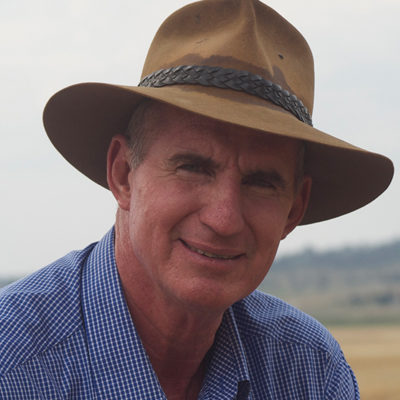
Paul McIntosh
Regional Winner | Productivity category
Dubbo to Burdekin, NSW & QLD
Paul McIntosh is an adviser at Pulse Australia and Weedmart and a 2020 Growth Awards Regional Winner in the Productivity category. Read on to learn more about Paul.
What’s the one thing you have done in your career you are most proud of?
The whole issue of weed control and my role in managing weeds is something I am proud of. I was one of the people who heavily pushed zero till/minimal till when Roundup was introduced in the late 1970s. It was pretty new and exciting at that stage as it was a huge step forward from using tillage for weed control. The zero till phenomenon allowed us to preserve our soils, increase moisture in soils, and looking after our soil structure was a very big part of it. Of course, given my time in the industry, I’ve gone through the whole arc with weed control and now one of my roles involves dealing with herbicide resistance and trying to maintain our pesticides efficacies and specifically herbicides into the future.
How will you share what you learn with others in the industry?
Any information I gain through the Syngenta experience could be shared through the platforms I use now. The Weedsmart platform is extremely useful in sharing things that I have information and influence on, in respect to our current and future weed control tactics.
It also helps that I have the ear of local TV services, the ABC rural radio and regional newspapers, plus I do a large number of speaking engagements each year, which allows me to distribute my new and old agronomic knowledge. Whilst I am not a big fan of it (due to my age bracket I suspect), social media does play its part in providing a platform to talk about issues, discuss them and put out new ideas about farming in this dry landscape of Australia.
What do you see as your biggest opportunity in the next 12 months?
The pulse industry is facing increasing pressure about maximum residue limits (MRL) in crops sold to our important export markets. Some markets are now requiring 0.00 PPM (mg per kg) or essentially, zero residue tolerance levels to particular pesticides. The issue lies with the herbicide desiccation practices which are applied before harvest in many crops, particularly pulse crops.
I am working with growers in the northern region to trial and commercialise the practice of swathing or windrowing, which will allow the chickpea or mung bean crops to be swathed or windrowed. Then using a pick-up reel for the actual harvesting process, negating the need for any desiccation spray. Early trials on some fairly large areas show it works – and there certainly appears to be minor loss of grain and little effect on quality. Given that 98 per cent of desi chickpea and mung beans grown in Australia are exported, MRLs are something that we need to tackle and have a plan B in place for those countries seeking zero tolerance of various pesticides in their imported pulse crops.
What is the biggest barrier to achieving success in the next 12 months?
If we are talking about the move to swathing crops rather than using desiccating sprays, then narrow mindedness might stand in the way of this method being used. Yet more broadly, the biggest barrier to success is poor forecasting of rain. If we had better forecasting, we could make better decisions, both in terms of what crops to plant and this new harvest technique in pulse crops called swathing. Given our climate, the lack of rain makes it difficult to successfully grow profitable crops for our farmers - but more accurate rain forecasting could really help this. We also need crops that can better handle the dry Australian conditions and temperature extremes.
What is the biggest challenge Australian Ag has to overcome in the next 10 years?
We need to be able to maintain our export markets and that will come down to having varieties which can handle drier conditions and GM crops could do this. While MRLs are an issue for our export markets, so is continuity of supply. We can’t always supply the consistent tonnages, that our exporters want. In 2016, Australia grew over two million tonnes of desi chickpeas and this year, it will be about 500,000 to 600,000 tonnes. The introduction of specific GM crops targeted at making the most of PAW would provide better crop performance in our extremes of temperature. Our conventional breeding methods are not delivering better performing varieties fast enough to meet the world demand for food. GM crops developed to survive extremes of temperature and the lack of moisture we suffer in Australia, could deliver consistency of food supply for our export markets and the world.